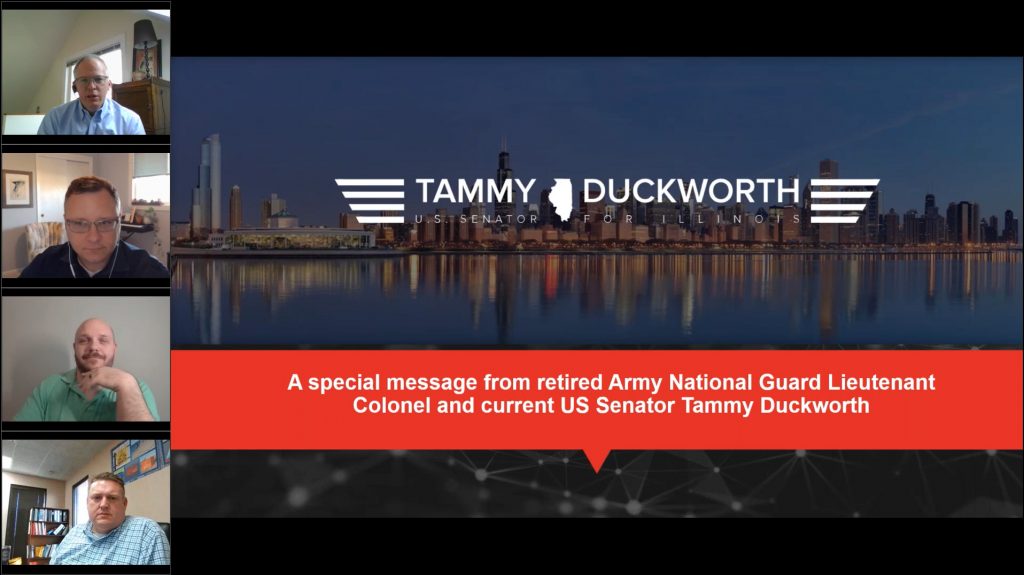
By MxD
Service, networking, and giving back were the major themes that emerged during MxD’s Veterans Appreciation event on Nov. 19. Moderating the virtual Q&A was Michael Yucuis, MxD’s government engagement manager and an Air Force veteran.
Yucuis interviewed Army veteran Paul Brown, plant manager for Fol-Da-Tank, which makes portable water tanks for the U.S. military, firefighters, the U.S. Forest Service, and others. They were joined by Coast Guard veteran Jon Powvens, MxD’s cyber director and head of the National Center for Cybersecurity in Manufacturing. U.S. Sen. Tammy Duckworth even made an appearance, delivering a pre-recorded welcome to kick off the event.
This transcript of their conversation has been edited for length, but you can watch a recording of the entire discussion here.
Michael Yucuis: There’s no better experiential learning environment for a manager or a technician than on the job, serving your country. It is imperative that veterans can find their six when leaving the services and connect with the vast network of supporting veteran organizations that are around them.
Our first guest today is a member of QCVN [Quad Cities Veterans Network]. He first approached them as a job seeker and is now plant manager for Fol-Da-Tank, which is in Milan, Illinois.
So for you Paul, when you got out of the army [in ‘93], was your first thought, “I’m going to go run a manufacturing plant in the Quad Cities?”
Paul Brown: No, my first thought was to utilize the GI Bill and the college fund. As one individual pointed out to me when I was in the military, only two people join the military, those who want free education or those who have nowhere to go. I took the education.
Yucuis: You went to UIC, correct?
Brown: Yes, sir. I got a degree in Industrial Design.
Yucuis: Was that connected to your service? Was there a clear line between A and B? When you got out, you knew that’s what you wanted to do?
Brown: With the military, I did a lot of fleet management and maintenance management for the entire 3rd regiment of the East 11th ACR over in Bad Hersfeld, Germany, which kind of taught project management and multitasking. The first job I had out of college actually was during college. I got hired my senior year to utilize the project management skills that I was trained and taught in the military. I graduated and I got transferred to Ft. Worth, Texas, to manage 14 project managers. So the military definitely put the great foundation [in place].
Yucuis: There’s that sink or swim mentality.
Brown: Yeah, there was a gentleman when I first started being a project manager, and his philosophy was a sink or swim. His philosophy was, I’ll drop a silver dollar in the pool and I’ll kick the people in it and look to see where it is. If they sank to the bottom, he’d just go ahead and let them sit there and rot in the bottom of the pool, but if they rose to the top, they might last six months to a year in the company. I try to give better training to my employees when I hire them. But that’s the mentality that I was brought into the professional world with.
Yucuis: There are certainly lessons to be learned even when it’s somewhat negative.
Brown: Very much so.
Yucuis: I feel like most of my resilience is directly related to six months living at Saddam’s mom’s house in Iraq. So it wasn’t the best of times, but I certainly learned a lot.
So now Jon, in your case you joined the Coast Guard right after 9/11?
Jon Powvens: Correct. 9/11 happened my last year of college, and I felt the need to do something. So I finished up and then got a few affairs in order and enlisted.
Yucuis: Was there a direct connection between what you did in the Coast Guard and your next career step?
Powvens: No, It was a very broken path. I had fallen in love with electronics, which is what I was doing for the Coast Guard. I went to school for electronics engineering on my GI Bill. Just to make sure I was using my benefits. It was the post 9/11 GI Bill; it’s a fantastic bill. So if you have those benefits do take advantage of it, because it’s never been better for veterans.
[I] was doing radio work largely until I was working at a company that had a cyber event. Cybersecurity was not a topic that people talked about at the time. It reignited the passion for being in computers and IT and specifically cybersecurity.
And I sucked up every piece of education I could find. I went to every course I could take. I surveyed classes at university because I couldn’t afford to go back to school specifically for it. So I just surveyed courses and was able to pick up a lot of really good information. I did a lot of research and that’s how I got where I was. For me I had to find something I was passionate about, and that really fired off my career.
Yucuis: There’s a theme that I’m detecting. It’s the sink or swim aspect of our military careers. You see a gap, right? And you identify it and you go to your boss, whether it’s the chief or a colonel, and you’re like, “Sir, you know, we’ve got this problem, and we should really build a team that fixes it.” And generally, their answer was always “Well, thanks for volunteering, and I can’t wait to see what you do.” What advice do you have [for] a prospective employee?
Brown: I went back to get my MBA 2014-2016. I first started thinking: I’m going to get this MBA, get out and I’m going to get a six-figure job, I’m just going to make it big in the world. It’s the farthest thing in life what really happens. It’s not the degree that gets you [far] in life. It’s the networking and the people that surround you.
Since I’ve been back to the Quad Cities, I got involved in the Quad Cities Veterans Network. I have gone the last two months, and it’s been a fabulous networking event. I have found out you don’t have to go ahead and spend thousands of dollars for an MBA or getting an undergrad. Find groups that will help aim you in the right direction.
Even the position I have now. It was from networking with somebody that I knew. I didn’t get this based on three little letters after my name for a degree. I got this from networking.
But the biggest advice is: Don’t think you can do this life on your own. If somebody gives you a helping hand grab on, let them pull you up. And who knows, you might get pulled up with somebody and ride their coattails to a fantastic career.
Yucuis: That’s excellent. Jon, I have a similar question for you in the context of cybersecurity.
Powvens: I’ll piggyback off a little bit of what Paul was saying, I’ve never worked with anyone or known anyone who has a cybersecurity degree. Maybe some universities are starting to have them, but I’m not running across people who have those degrees. [Cybersecurity] is a never-ending learning cycle. It’s a never-ending grind. The threats change; the attack methods change. So your knowledge has to change and grow and evolve with it. This is an area [where] there is tons and tons of education available for you. Through websites, through YouTube, through different courses that you can take.
If you’re at a company and there’s a cyber department, go volunteer to work for that department. They don’t have time to train you, but see if you can’t sit with them for two weeks and learn from them. See if you can’t volunteer to look at things after hours for them.
If you’re in the military today, you’re familiar with missions, find your mission, see how you can fulfill that mission and become a part of those solutions.
Yucuis: I think we have identified a few themes as it relates to veterans, right? It’s that sink or swim, don’t-know-any-better-so-I’ll-just-do-it mentality. But also, you hit on the mentorship part. I think that’s what I miss most. If you don’t have a plan, there are mentors around.
I don’t think any of us would ever balk at the chance to talk to someone old or young, and show them something new.
[I] now rep manufacturing across America, but I’m proud to because if it’s made here, it’s just inherently better. There’s that mission set that we all kind of ascribed to. And if we can make it better, and we can make the next one better, and keep that cascade going, we can kick anybody’s butt. So America does.
Any final words from you gentlemen?
Powvens: I’ll just say, every time that I’ve been in charge of or involved with hiring, if a veteran’s resume comes across my desk, that veteran gets an interview. And I will always do that whether you’re qualified for the position or not, I’ll take the time to talk to you and interview you. And hopefully, if you’re unqualified, point you in the right direction. But I am committed to that and I will always continue to do that.
Yucuis: I appreciate that. Paul, what about you?
Brown: Same thing. Veterans take priority. I worked many years of construction. We did a lot of projects with the Heinz VA Center in Chicago and up at the Great Lakes Naval Training Center. Anytime I was a military private guy, we volunteered for those. It was my honor to give back to the military what they gave to me. The things I learned while I was in were invaluable.
Yucuis: Thank you, Paul. Jon, thank you. I’m thankful for the opportunity to still be involved with the Department of Defense and in our own way involved with veterans as much as we can. Gentlemen, thank you so much for your time.
Watch the full discussion here. To speak with Michael Yucuis about how you as a veteran or your company can partner with MxD, email him at Michael.Yucuis@mxdusa.org
